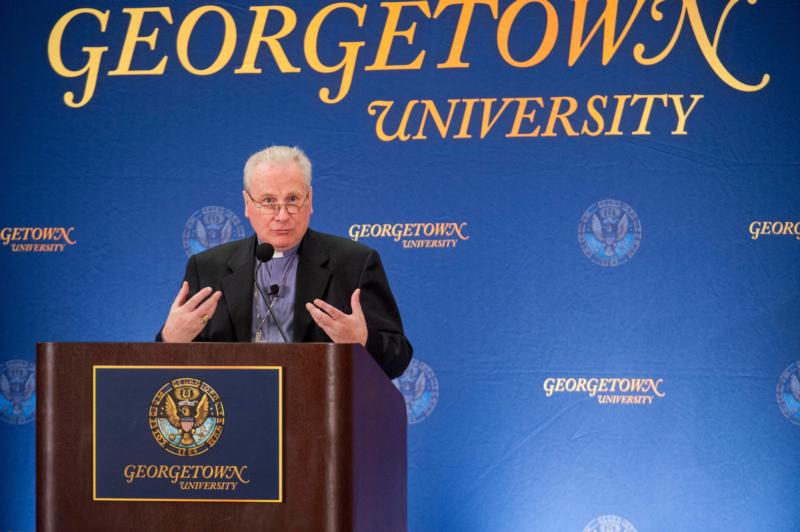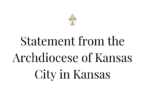
by Carol Glatz
VATICAN CITY (CNS) — Once the top expert on Islam at the Vatican, Cardinal-designate Michael Fitzgerald is unsure whether a new top-ranking title will help or hamper his work ministering in a multicultural inner-city parish in Liverpool, England.
“Ask me in a few years” to see how it goes, the 82-year-old former president of the Pontifical Council for Interreligious Dialogue and papal nuncio to Egypt and the Arab League, told Catholic News Service Sept. 12.
He and 12 other prelates will be created cardinals in a ceremony at the Vatican Oct. 5. He is one of three who are over the age of 80 and will not be eligible to vote in a conclave to elect a new pope.
Cardinal-designate Fitzgerald said while many people have welcomed his elevation to the College of Cardinals, he was hoping others would not be intimidated and think, “We can’t invite him now. He’s too important!”
Having a high profile isn’t a priority in his day-to-day work reaching out to migrants and Muslims in a city that had the earliest mosque in England and has the oldest Chinese community in Europe.
“We have to go out and try to make ourselves known” since many people have moved to the area with no idea a Catholic church is there, he said in a February 2019 interview posted online by the Missionaries of Africa, the order to which he belongs.
Since the missionaries are near Chinatown, “our neighbors are Chinese” and the priests are hoping to build relations with them and the evangelical church close by as well, he said.
The day Pope Francis announced his name among the new cardinals, the cardinal-designate was delivering a sermon in an Anglican church at a service commemorating the merchant seaman who died in World War II.
That meant he didn’t know about the announcement until he got home to his confreres of the Missionaries of Africa who embraced him in celebration.
“They had a call from a neighboring priest who had heard the Angelus and told them,” the cardinal-designate told CNS.
He said he thinks it very significant Pope Francis will give red hats to prelates from the Muslim-majority cities of Rabat, Morocco, and Jakarta, Indonesia, as well as the former and the current presidents of the interreligious council.
By making them cardinals the same day, Pope Francis is highlighting “this aspect of the church’s mission, that reaching out to other believers is important,” he told CNS.
Born Aug. 17, 1937, to Irish parents in a small town north of Birmingham, England, he once told CNS that his interest in interreligious dialogue may have stemmed from growing up with friends who were “not all Catholics and not all Irish.”
He pursued his dream of becoming a missionary priest and heading to Africa when he went off to school with the Missionaries of Africa at age 12 in 1949.
Arab North Africa piqued his interested and eventually he was sent to Tunisia to study theology for four years and learn Arabic. He would later earn a degree in Arabic at the University of London.
He was ordained a priest in 1961 at the age of 23 and spent two years teaching courses on Islam to Muslim and Christian students in Kampala, Uganda, during the reign of the dictator Idi Amin. He also lived for two years in northern Sudan, carrying out dialogue with Muslims and proclaiming the Gospel to a small Christian community there.
He was frequently called back to Rome, either to teach at the Pontifical Institute for Islamic and Arabic Studies or to hold offices on the general council of the Missionaries of Africa.
His experience made him one of the Catholic Church’s foremost experts on Islam and the Quran, and in 1987 he was appointed secretary of the Vatican’s Secretariat for Non-Christians, which later became the Pontifical Council for Interreligious Dialogue. He was ordained a bishop in 1992 and became archbishop in 2002 when he became president of the pontifical council.
In February 2006, he became nuncio to Egypt and served as the Holy See’s representative to the Arab League. He and other nuncios of Muslim-majority nations dealt with the controversy and violence in the aftermath of Pope Benedict XVI’s address in Regensburg, Germany, in which his quoting a medieval emperor’s critique of the prophet Muhammad was misinterpreted as an endorsement of that view.
Archbishop Fitzgerald witnessed the uprising of the Egyptian people in 2011 and kept encouraging dialogue at the local level after Muslim clerics at Cairo’s al-Azhar University suspended the official Catholic-Muslim dialogue with the Vatican over concerns of interference when Pope Benedict expressed concern for Christians after a church bombing in Egypt.
Even though he retired at age 75 at the end of 2012, retirement for Cardinal-designate Fitzgerald meant going to the Missionaries of Africa community in Jerusalem to welcome pilgrims, teach courses on the Bible and give talks on Islam.
He moved back to England in late 2018 to work in the inner-city parish of St. Vincent de Paul in Liverpool. It came after the order recognized its mission was to minister not just on the African continent but to all Africans, wherever they live, and it opened a mission in Great Britain.






